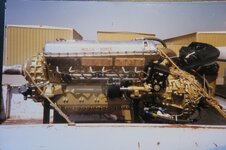Escuadrilla Azul
Tech Sergeant
- 2,123
- Feb 27, 2020
A more dignified pic of a Whitley, with a long bombing mission record.

Follow along with the video below to see how to install our site as a web app on your home screen.
Note: This feature may not be available in some browsers.
Ad: This forum contains affiliate links to products on Amazon and eBay. More information in Terms and rules
Punishment for crimes such as these are deserved but the politics behind jurisdictional disputes are simply politics.Which side has criminal jurisdiction?
- Aftermath of the British seamen incident in Kobe City
In June 1952, HMS Belfast which was operating in Korean waters entered Kobe Port for a ceremonial visit to Japan. On the 29th, seamen Stina and Smith attacked a taxi to rob the car and 1,700 yen (around 300 dollars in modern value). They abandoned the taxi and, while drinking at a bar in the city, officers from Ikuta Police Station arrested them.
Kobe District Public Prosecutors Office, with the approval of Supreme Public Prosecutors Office, indicted both men on charges of robbery on July 2. On August 5, Kobe District Court sentenced them to two and a half years in prison. However, on the same day, British Foreign Secretary Eden requested Japanese Ambassador Matsumoto "I hope these seamen will be returned to their home immediately" and British Ambassador Dening to Japan also told Japanese Foreign Minister Okazaki on the 6th to protest "Prime Minister Yoshida promised to hand over UN criminals to the UN Forces till the UN Forces Agreement is reached. Japan has no jurisdiction over this matter."
In response to these protests, Japanese government claimed that Japan had jurisdiction over the case (as Yoshida memo was not official one) but, in fear of worsening the Japan-British relations, the government tried to release the defendants to seek a political solution. However, Osaka High Court refused to release them claiming that the defendants would need a reliable person who could prevent them from fleeing our country. In the end, this case was settled with a two-year prison sentence at Kobe District Court first and then a suspended sentence at Osaka High Court to return them to their home.
On November 22, however, another robbery incident occurred in Tokyo by British and Australian soldiers. Crimes committed by the UN personnels had once again become a diplomatic issue as British and Australian governments demanded the extradition of the perpetrators.
The perpetrator, British seamen (upper right), British, Australian, Canadian and New Zealand ambassadors discussing the UN Forces jurisdiction issue (mid-right), British and Australian soldiers arrested in Tokyo (lower)
View attachment 749066
British seamen case appeal trial (upper) Witness Keiko Yoshida testifies (lower left) Reference opinion by Professor Kisaburo Yokota. He gave an ambiguous comment regarding the practice of jurisdiction (lower right)
View attachment 749067
Source: Pictorial Modern History: Postwar World and Japan Vol.13 (1955)
What a fair person you are, Neil! God will save your country because of it certainlyPunishment for crimes such as these are deserved but the politics behind jurisdictional disputes are simply politics.
The yen to dollars exchange rate in 1952 was the same as when I was there in 1966.Which side has criminal jurisdiction?
- Aftermath of the British seamen incident in Kobe City
In June 1952, HMS Belfast which was operating in Korean waters entered Kobe Port for a ceremonial visit to Japan. On the 29th, seamen Stina and Smith attacked a taxi to rob the car and 1,700 yen (around 300 dollars in modern value). They abandoned the taxi and, while drinking at a bar in the city, officers from Ikuta Police Station arrested them.
Kobe District Public Prosecutors Office, with the approval of Supreme Public Prosecutors Office, indicted both men on charges of robbery on July 2. On August 5, Kobe District Court sentenced them to two and a half years in prison. However, on the same day, British Foreign Secretary Eden requested Japanese Ambassador Matsumoto "I hope these seamen will be returned to their home immediately" and British Ambassador Dening to Japan also told Japanese Foreign Minister Okazaki on the 6th to protest "Prime Minister Yoshida promised to hand over UN criminals to the UN Forces till the UN Forces Agreement is reached. Japan has no jurisdiction over this matter."
In response to these protests, Japanese government claimed that Japan had jurisdiction over the case (as Yoshida memo was not official one) but, in fear of worsening the Japan-British relations, the government tried to release the defendants to seek a political solution. However, Osaka High Court refused to release them claiming that the defendants would need a reliable person who could prevent them from fleeing our country. In the end, this case was settled with a two-year prison sentence at Kobe District Court first and then a suspended sentence at Osaka High Court to return them to their home.
On November 22, however, another robbery incident occurred in Tokyo by British and Australian soldiers. Crimes committed by the UN personnels had once again become a diplomatic issue as British and Australian governments demanded the extradition of the perpetrators.
The perpetrator, British seamen (upper right), British, Australian, Canadian and New Zealand ambassadors discussing the UN Forces jurisdiction issue (mid-right), British and Australian soldiers arrested in Tokyo (lower)
View attachment 749066
British seamen case appeal trial (upper) Witness Keiko Yoshida testifies (lower left) Reference opinion by Professor Kisaburo Yokota. He gave an ambiguous comment regarding the practice of jurisdiction (lower right)
View attachment 749067
Source: Pictorial Modern History: Postwar World and Japan Vol.13 (1955)
Thanks for your kind comment, tyrodtomThe yen to dollars exchange rate in 1952 was the same as when I was there in 1966.
360 yen equals one dollar.
1700 yen would be $4.72 in 1952.
I don't see how less than $5.00 in 1952 could be inflated to $300. now.

Why, such a creature attending to a wounded man would give a fellow hope and a promise of good to come.Japanese Nurse Dressed In Black During The Russo-Japanese War, 1905
What a pretty woman that was.
View attachment 749514




Some more pics.IJN Nagato and Akagi - movie set pics for "Tora Tora Tora" in 1968.
I may have introduced them many years ago. If so, please take apology.
View attachment 645226View attachment 645227View attachment 645228View attachment 645229View attachment 645230View attachment 645231
Source:
kidegun (page1 to 6)